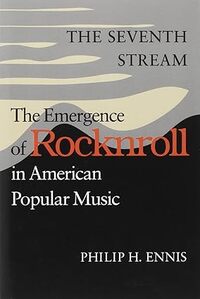- Work (Individual)
- 13. Ιστορία της Αμερικανικής Rock μουσικής
- Πληροφοριακές πηγές ψηφιακής βιβλιοθήκης
- 1992
- Αγγλικά
- Ennis, Philip H. (1925-)
- Ιστορία και κριτική | Ροκ μουσική
-
-
Philip Ennis presents a major social and cultural study of the origins and evolution of "rocknroll." With masterful command of general trends and telling details, he describes the artistic, economic, and political context that nurtured this radically new popular music. This "seventh stream," which drew from existing forms of pop music, began as a youth movement of rebellion and remains a worldwide banner of youth in search of alternatives.
"Rocknroll" emerged, he shows persuasively, from the successive meeting and melding of the other six "streams"―pop, black pop, country pop, jazz, folk, and gospel. He chronicles how these were shaped by struggles over musical property rights, and by the new technologies of radio and phonograph record.
The most decisive clash was between the New York based music publishers and the radio broadcasters. Their decades long contest resulted in many cultural changes. The basic unit shifted from sheet music to the phonograph record. The radio disc jockey in small, independent radio stations became the new focal point for all the popular musics. New venues, audiences, and talent appeared throughout the nation.
The appearance of "rocknroll" marked a significant cultural moment, argues Ennis. This "seventh stream" was part of an explosive efflorescence in all the American arts after World War II. Its early stars―Little Richard, Chuck Berry, Jerry Lee Lewis, and Elvis Presley―built a pantheon of performers with deep roots in all the other streams.
⟶ Wesleyan University Press
-
-
-
A cultural and social study of the origins and evolution of "rocknroll".
⟶ Wesleyan University Press
-


